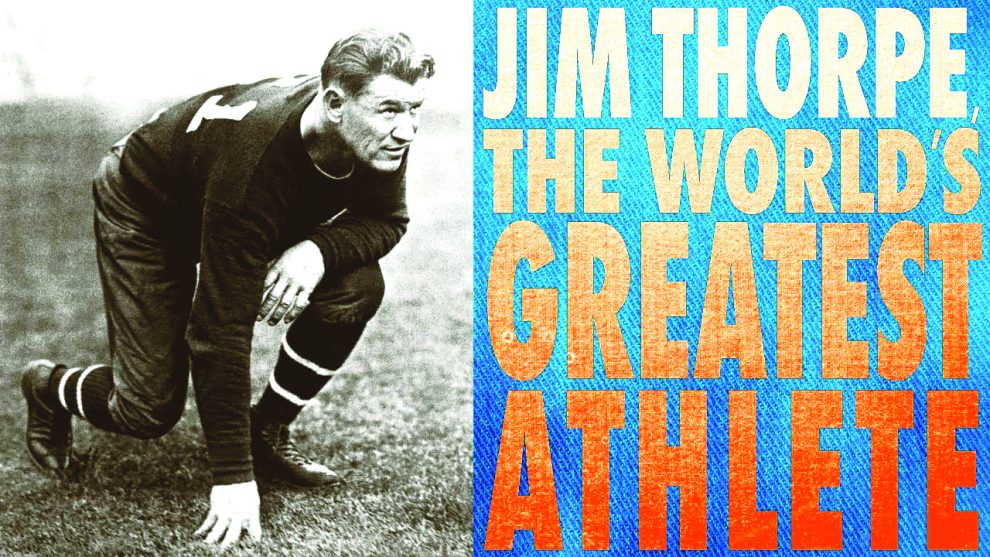By Natalya Bucuy • The Current Contributing Writer
How did Jim Thorpe become Jim Thorpe?
The town’s origin story contains some intriguing details. A unique fundraising campaign, a world-renowned athlete, who never stepped foot in the town, and a U.S. Supreme Court case are just a few worth mentioning.
Industrial beginnings
The town traces its roots back to 1818. The Lehigh Coal and Navigation Company established its headquarters and a worker’s village on the Lehigh River that year. The village took the name of Mauch Chunk, which means “Bear Place” in the Munsee-Lenape Native American language of the region.
A prominent Carbon County town, Mauch Chunk remained a booming industrial and transportation center for more than a century. However, as the coal industry diminished and the Great Depression’s effects took hold, the town faced economic challenges. In the 1950s Mauch Chunk looked for unique ways to escape poverty and despair. And it found it in the most unexpected place.
Jim Thorpe: Distinguished Athlete of the 20th Century
James Francis Thorpe was born on May 28, 1888, in the Indian territory of modern Oklahoma. Predominantly of Sac and Fox American Indian descent, Thorpe attended Carlisle Indian Industrial School in Pennsylvania, his only direct connection to the area.
A talented athlete in various sports, in 1912 Thorpe won the decathlon and the pentathlon by wide margins at the Olympic Games in Stockholm. Unfortunately, in 1913 the Amateur Athletic Union discovered that prior to his Olympics performance Thorpe played in the semi-professional baseball league and got paid for it. That fact disqualified him from the Olympics by the rules of the time. Thorpe lost his gold medals. It wasn’t until the 1980s that his wins were reinstated and his family received his medals back.
Thorpe continued to play baseball, football, basketball, boxing, lacrosse, swimming, and hockey. In 1920 and 1921 he served as the first president of the American Professional Football Association, which later became the National Football League NFL. His achievements in such a diverse variety of sports earned him international recognition. The Associated Press voted Thorpe the third greatest athlete of the 20th century, behind only Babe Ruth and Michael Jordan. In 1963, Thorpe was inducted into the Pro Football Hall of Fame.
A Win-Win Deal
Following Thorpe’s death in 1953, his third wife and widow Patricia Gladys Askew sought ways to commemorate her late husband. His native Oklahoma refused to erect a memorial so she took her search elsewhere.
At the time Mauch Chunk ran its innovative “Nickel a Week” donation campaign in an attempt to revitalize the town. Residents contributed nickels to the campaign and raised $30,000 in nickels within a few years.
Using $10,000 from the fundraising campaign, the town erected an elaborate red marble mausoleum on a hill in East Mauch Chunk. Thorpe’s remains were moved to the site. An elaborate ceremony officiated in part by Native Americans honored the athlete. His crypt was sealed with soil from his hometown in the Sac and Fox nation, the track fields from the Stockholm Olympics, and the grounds of the Carlisle Industrial Indian School. In 2007, a life-sized bronze statue of Thorpe in his football uniform was erected at the memorial. In exchange, the town renamed itself after the athlete. And so, in 1954, Mauch Chunk merged with East Mauch Chunk and became Jim Thorpe and the Carbon County seat.
Jim Thorpe Renaissance
The changes didn’t come right away, but they came. Fortunately, the town didn’t have enough funds to bulldoze many of its dilapidated buildings as it originally planned. And so, many of the town’s historical gems still stand. Among those are the Mauch Chunk Opera House and the Inn at Jim Thorpe. Since the town’s rebirth, storefronts and homes on Race and Broad Streets have been welcoming visitors with their unique charm and history.
In the later part of the 20th century, outdoor activities such as hiking, biking, kayaking, and white water rafting gained popularity. With the mountainous setting and the quaint charm of the town, Jim Thorp’s tourism soared.
In 2010, Jack Thorpe, the athlete’s son, filed a lawsuit that demanded the return of his father’s remains for reburial in Thorpe’s tribal homeland in Oklahoma. Thorpe claimed that the town is keeping his father’s bones as a tourist attraction. According to the complaint, refusing to return the remains constitutes a violation of the Native American Graves Protection and Repatriation Act (NAGPRA.) The borough of Jim Thorpe claimed the burial was not a tourist attraction as defined by NAGPRA and that Thorpe’s wife had the right to place her husband’s bones in a public shrine. Following multiple appeals, the case made it all the way to the U.S. Supreme Court. The highest judicial branch denied the appeal, ruling for the remains to stay in Jim Thorpe in 2015.
Happy Birthday, Jim Thorpe!
For decades, every year in late May, the community came together for Jim Thorpe’s birthday celebration. The festival celebrated prosperity and the town’s honorary citizen. Although the event takes a pause this year, local authorities plan a redesigned version of the festival to return in 2024.



























Add Comment